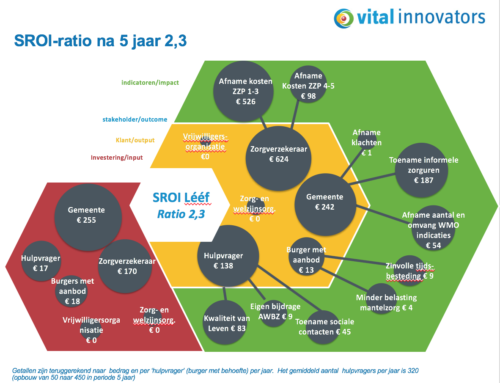Before introducing a new regulation or law, do a so-called performance test: What is the impact on the various parties? Which processes/systems need to be adjusted? Are there any exceptions conceivable?? In addition, you must be agile and want to continuously adjust the plans.
Intention
then in 2015 the decentralization of government tasks to municipalities took place, Municipalities became responsible for youth care. The Youth Care Act for Families with Upbringing- and growing up problems was then changed into the Youth Act. The new Youth Act was extended to other target groups, including youth with mental health problems. One of the regulations from the old law, the parental contribution, was adopted in the Youth Act and now also applied to the new target groups. In practice, the arrangement meant that parents paid a contribution to pay for part of the accommodation costs of their children in hospital.. Parents would have less costs if their child does not live at home, was the idea.
Previously, the proceeds of the parental contribution flowed, about 11 million per year, to the treasury. Many of these contributions were ultimately not collected because the correct information was not passed on. This was a known fact for the concerned ministries. The moment of decentralization and with it the shift of responsibility and budget to municipalities, was seized to rectify this. By realizing a financial incentive for municipalities, from 1 January 2015 stricter supervision of the implementation of the parental contribution scheme. This would then create a revenue increase.
Approach
On the macro budget for youth aid, that per 2015 would go from central government to municipalities, the amount of the parental contribution scheme was deducted. Municipalities had to receive this amount themselves via the implementing agency CAK. In short: a significant financial incentive. The Ministry of Finance bet on an amount of 45 million, but eventually came to an amount of 26 million match.
The Central Administration Office (CAK) started to implement the parental contribution scheme under the new law. To realize this, the CAK set up an ICT system and the CAK would take care of collecting the amount. After this, the proceeds would go to the municipality.
The subject was discussed in the House of Representatives of the Youth Act (February 2014) not an important point of attention, because it was seen as a regular performance that could be included in the new law. As a result, important changes in the implementation of the scheme and with regard to the target groups concerned were not immediately clear to the stakeholders, such as the municipalities and GGZ.
Result
In the summer of 2014 municipalities discovered that they had to start collecting the parental contribution. Under the old law, there were only fifteen authorities that passed on the parental contribution, under the Youth Act, it turned out that there were no fewer than around 400. The CAK held work sessions with municipalities, but the ICT system that was supposed to facilitate the administrative process still did not work sufficiently. Municipalities resist because they (to) foresaw large administrative burdens. In the fall of 2014 the GGZ discovered that the parental contribution would extend to children who need psychiatric help. There was great resistance and the House of Representatives urged further investigation into the implications of the scheme, what State Secretary Van Rijn in January 2015 promised.
In January 2015 the Youth Act was introduced, but the implementation of the changes in the parental contribution scheme failed due to the information exchange between CAK and the municipalities. There was a lot of resistance from the GGZ. The study showed that there is not always a cost saving for parents with children in residential care. It also emerged that parents with a low income were not exempted from the obligation to pay as standard. In the end, it was decided to abolish the parental contribution in its entirety, one year after the Youth Act came into effect. This only happened when the Ministry of Health, Welfare and Sport moved outside the existing frame of mind, “The parental contribution is something that is part of the law”, went to see. Municipalities wanted to abolish the 26 million per year through the macro budget for youth care. The means for this were found.
Lessons
- Simple-looking performance issues can become a political issue. So take a good look at what the new situation looks like, which (new ones) players come into the field and what happens in the field. And then the question is whether you can provide everything properly.
- You cannot simply use a measure for multiple target groups, because the same measure can be different for another group.
- Communicate in time which change is coming and take into account a reduction period. A collection agency like the CAK needs another five years to phase out.
- Give yourself the space to out of the box choose solution. In this case that was stopping the parental contribution.
- The research into the parental contribution has provided a lot of information. There is more insight into the costs that parents incur for their child. With that information it was also easier to make the decision to stop.
- Sometimes schemes seem like good solutions, but they don't turn out as intended. Of course, it was not the intention that the municipalities would receive more administrative burdens.
Name: Janine Huiden-Timmer
Organization: VWS Ministry
OTHER BRILLIANT FAILURES
Sick but not pregnant
Never assume that everyone is fully informed, especially when there is new information informatie. Provide a knowledge environment in which everyone can make his or her decisions. check what [...]
Care and Government – Good and consistent care benefits from a more equal relationship
Intention In 2008 I started my healthcare company, I started my healthcare company. The aim was to provide help to people who are caught between two stools by means of [...]
Who finances lifestyle in cardiac rehabilitation?
Beware of the chicken-egg problem. When parties are excited, but first ask for proof, check carefully whether you have the means to provide that burden of proof. And projects aimed at prevention are always difficult, [...]












